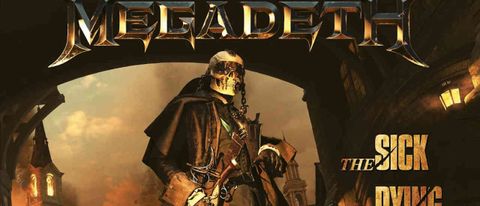Sharp, catchy and as subtle as a two-by-four across the forehead, 2016’s Dystopia found Megadeth striking creative highs not seen since 1992’s Countdown To Extinction. Drawing fresh inspiration from new guitarist Kiko Loureiro and ex-Lamb Of God drummer Chris Adler, Dystopia tapped into that fiery amalgam of menace and paranoia that has underpinned the band’s finest works. It also earned Megadeth their first Grammy and put the world on notice that Dave Mustaine still had plenty to say.
Both Megadeth’s future and Dave Mustaine’s longevity were called into question when the frontman disclosed his throat cancer diagnosis in 2019. But after aggressive treatment, Mustaine declared himself “100% cancer-free” a year later, reaffirming that MegaDave has more lives than a city of cats. Now Megadeth are poised to release their 16th full-length, The Sick, The Dying… And The Dead! (Dave does love those exclamation marks, doesn’t he?). The burning question is whether Dystopia was a one-off or the harbinger of a new golden age for Megadeth. Let’s not hide the ball – it’s the latter.
The Sick… showcases a depth and a compositional brilliance that’s rooted in this line-up’s uncanny ability to reimagine Megadeth’s iconic sound in a fresh and compelling way. All the elements that people love about the band – the scorching riffs, the striking technicality and the brawling, speed metal tempos – are here in spades. From the powder keg urgency of Life In Hell to the supersonic velocity of Célebutante, their latest outing lacks nothing in terms of aggression. There’s an invigorating sense of modernity at hand that’s very much down to the playing of drummer Dirk Verbeuren, whose thundering, machine-gun time-keeping pushes the sound into new realms of extremity. Convincing proof lies in the closer We’ll Be Back, one of the fastest and finest songs that Megadeth have ever written. Testament’s Steve Di Giorgio plays bass on the album (James LoMenzo has since been named Megadeth’s new full-time bassist), in tight lockstep with Dirk through every dizzying twist and turn.
Kiko again establishes himself as a thrilling counterpart to Mustaine, with the two fretboard virtuosos doggedly going head-to-head on bruising, mid-tempo beatdowns such as Killing Time, Dogs Of Chernobyl and the title track. Renowned for his precision and technicality, Mustaine deserves more credit for his ability to cut through a song’s complexity and drop in the kind of titanic, classic rock riffage that sets football stadiums alight. That quality abounds here, particularly in the spiralling chorus of Soldier On! and the seditiously catchy space rock fantasy, Mission To Mars.
Night Stalkers serves up some full- throttle, black ops fetishism with a disappointingly brief cameo from Ice-T, although it’s hard not to grin when he shouts, ‘Game’s over, bitches!’ In the Head-Scratchers Department, Sacrifice is basically Hangar 18 with different lyrics and without the killer breakdown. But these are minor quibbles when set against the overwhelming power of the rest of the album. Dave Mustaine once told this magazine that the album that he’d most like to be remembered for is Dystopia. Given all that he and the band have accomplished with their latest, it’s an opinion that he might like to revisit.


